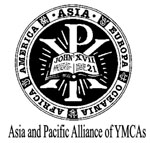|

1. Message from President and GS of APAY
2. Inauguration of New Vocational Training Institute in Bombay YMCA
3. ICF held a thematic workshop in North East India
4. World Alliance National General Secretaries Conference held in Palestine
|
|

APAY ECM postponed to: 1-3 July 2020
|
|
Message from President and GS of APAY
Dear Friends and Colleagues,
As all of us – communities of the YMCAs in Asia and Pacific region – are currently going through a very challenging time, we wish to extend our warm greetings and well-wishes to all of you.
As we all are well aware, the COVID-19 outbreak has developed up to the level of ‘pandemic’ affecting people’s life seriously not only in Asia but also in the whole world against our wish. The outbreak has thus brought, and continues to bring, negative impacts on the activities and programs of the YMCAs in our region and beyond. We have been informed by many YMCAs in the region that most of the YMCA programs/activities was cancelled or postponed due to the foreseeable risks by face-to-face meetings. Of course, this will result in financial constraints in these YMCAs as well.
It goes same to APAY as well. As you have been informed, the APAY March ECM was postponed to 1~3 July with the expectation that the pandemic will be under full control by that time. In addition, the ICF workshop scheduled to be held in Dhaka, Bangladesh along with Bangladesh YMCA’s inauguration of the new building, was also postponed to the near future. The PSG meeting for Laos YMCA (Organizing Committee) was postponed as well until after June. The World Alliance ECM, to be held on 20th to 22nd March, has just been decided to take place through ZOOM on-line meeting.
We believe that it is time for us to put our top priority on the health and safety of our people than any other consideration. At the same time, it is also time for us to look out for those people who are left behind from our attention or government’s care in protecting themselves from the pandemic – the elderly, the voiceless and the vulnerable people hardly seen on the surface of our societies. Even among ourselves – the different national/territorial YMCAs in our region, let us carefully look around to see if any of our YMCAs is particularly suffering from the impact of the persistent pandemic, and extend our generous service wherever needed.
We do wish and pray for your health, safety and meaningfulness in your daily life in the midst of the ongoing epidemic.
In prayer,
| Prof. Chen Chin-Seng |
Nam Boo Won |
| President, APAY |
General Secretary, APAY |
|
|
Inauguration of New Vocational Training Institute in Bombay YMCA - APAY President invited as chief guest for inauguration
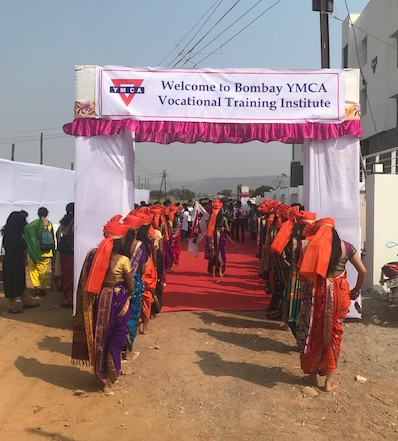 |
| ↑ Inauguration of the Training Centre with Indian traditional dance |
The Bombay Young Men’s Christian Association (YMCA) inaugurated its first vocational training center in rural Maharashtra at Kanhe, Vadgaon district near Lonavala on February 29th by the hands of Dr. Chin Seng Chen, President, Asia and Pacific Alliance of YMCAs. There were about 300 guests including Justice J.B. Koshy, National President, YMCA of India, Mr. Noel Amanna, President of Bombay YMCA, Adv. Rui Rodrigues, President, Y’s Men’s Club of Mumbai and many donors and representatives of the donation units from all over the country to participate in this event. Bombay YMCA has had exceptional success in the field of vocational training in urban areas. Now the YMCA is moving their attention to rural and underdeveloped areas of Maharashtra to fulfill its mission and meet the urgent needs of the people for such vocational training centers. It had also signed MOUs with three companies who will hire skilled laborers from the Institute.
Established in 1875, the Bombay YMCA has constantly innovated programs to meet the needs of the cross sections of society, especially the less privileged ones in the city of Mumbai. The launch of this vocational center also marks the commemoration of 145 years of YMCA in Mumbai.
According to the YMCA, the 23,000 square feet Community Development Center at Ambewadi in Kanhe village will provide courses on organic farming, bedside nursing, sewing, mehendi, welding, electrical works and tailoring ranging from three months to six months in length. Mr. Paul George, General Secretary, Bombay YMCA, said the organization had carried out a survey to understand available higher educational institutions and job sources near villages. “Many villages are as far as 25km from schools and colleges, whereas the nearest industrial training center is 60 km away in Lonavala. We also learned that many local industries were engaged in making spare parts of automobiles and therefore it was beneficial for the people of the nearby villages to become skilled laborers,” he said.
After visiting the center's facilities, Dr. Chen of APAY praised, ”This is a fully equipped modern, state of the art Vocational Training Institute. I am confident the students of this training center will make full use of these new facilities to improve their education and contribute to their community’s progress by achieving full and rewarding lives in the future.”
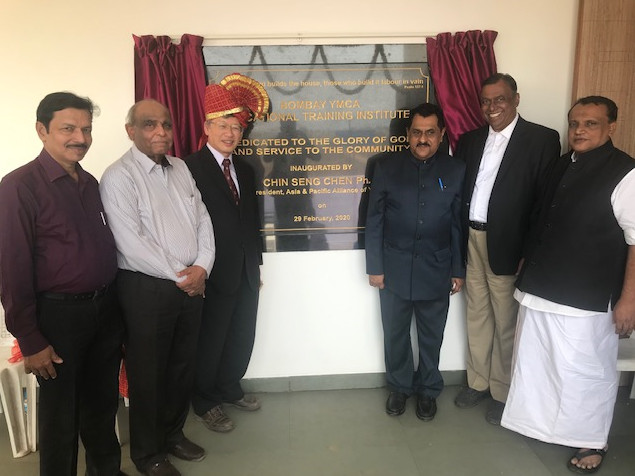 |
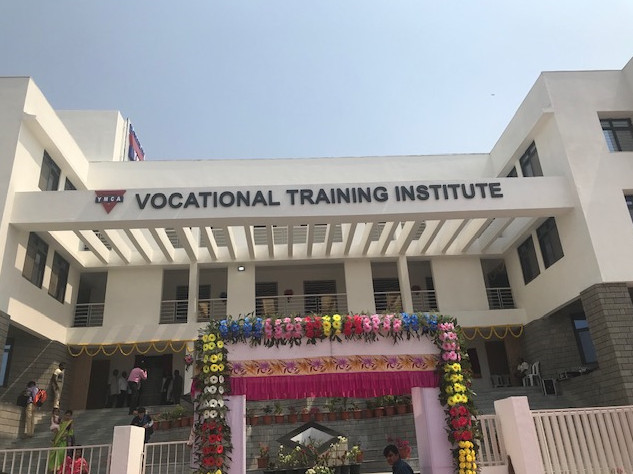 |
| ↑ Dedication Ceremony with key Indian YMCA leaders |
↑ Bombay YMCA Vocational Training Centre in rural Maharashtra
at Kanhe |
~ Prof. Chen Chin-Seng, President, APAY
ICF held a thematic workshop in North East India
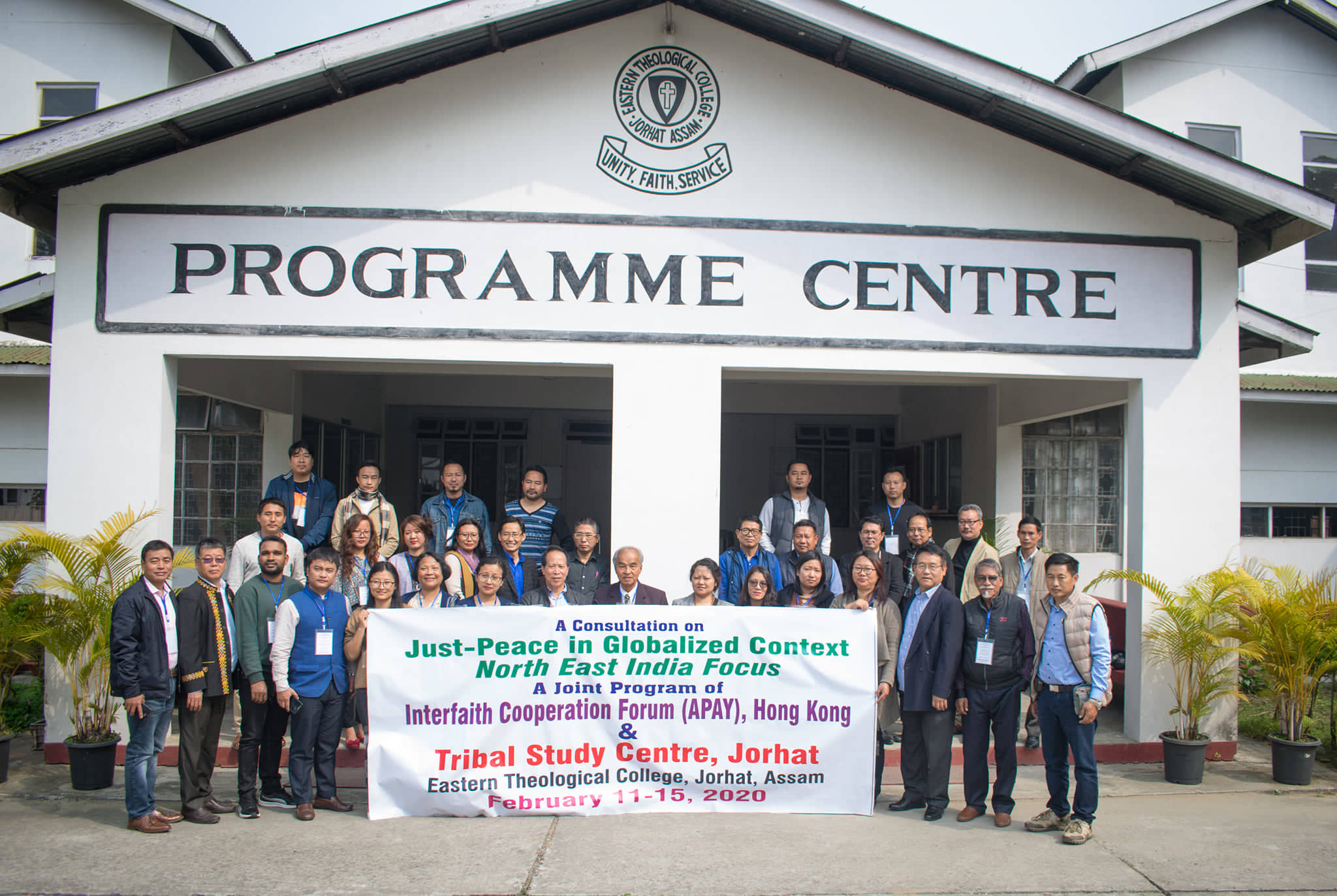 |
| ↑ Jorhat thematic workshop group photo with participants and resource persons |
Interfaith Cooperation Forum (ICF), a project of Asia and Pacific Alliance of YMCAs conceived of a thematic workshop on “Just-Peace in Globalized Context: North East India Focus” in cooperation with the Tribal Study Centre of Eastern Theological College in Jorhat, Assam, India. Dr. Wati Longchar helped in the arrangement and the workshop was set on 11-15 February 2020. The ICF Coordinator, Muriel Orevillo-Montenegro and Program Officer, Baidido Saganding were already set to go but were not able to fly to India due to the travel ban related to COVID-19. Since the preparations in the Tribal Study Centre were set, Dr. Wati Longchar had to take the helm and kind responsibility of seeing to it that the activity will be a success.
The workshop brought together 40 prominent people – young and the not-so-young - from various religious traditions (Hindu, Muslim, Buddhist, and a Heraka follower), disciplines, NGOs, activists, and scholars from various North East Indian region comprising seven states. The first day was set aside for an interactive and exposure trip to Majuli Island, the world’s largest river-island. This river-island is home to Assamese neo-Vaishnava culture that was started in the 15th century by a revered Assamese saint Srimanta Sankardeva, who also established several satras or monasteries. During the visit, participants were able to interact with the Auniati Satra and its monks. The participants also visited and interacted with the Christians whose church building was partially destroyed by a group of Vaishnavite Hindus. At the end of the dialogue, the participants were unanimous that Christian and Vaishnavas believe in love, equality, and diversity of God’s creation, and so they decided to stand together in solidarity to protect the Constitution of India.
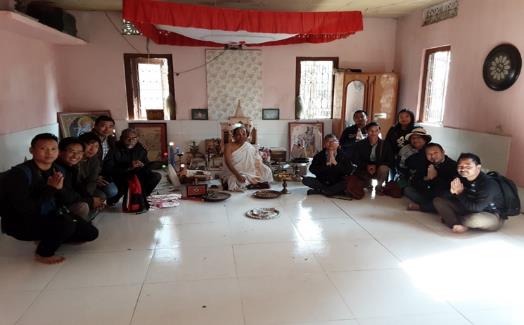 |
| ↑ Participants within an Assamese neo-Vaishnava monk at the Auniati Satra |
The second day focused on the Analysis of Global and National Unjust Structures. Under this theme, various resource persons and panellists made a presentation on various related sub-themes. Wati Longchar gave the keynote address on “Just-Peace in Today’s World,” in which he raised a number of issues critical to world peace and reiterated the need for interfaith dialogue for peace and harmonious co-existence. Following this, panellists representing various religious leaders and scholars deliberated on the contentious agenda of the existing Government of India, “One nation, One language, and One religion,” Wati Longchar gave another presentation on “Liberation or Assimilation: An Indigenous People’s Perspective.” The day ended with a presentation and deliberation on another burning issue of “Citizenship Amendment Act (CAA) and its Implications on Indigenous communities in North East India (NEI).”
The third day focused on “Religio-Cultural Structures and Peace Initiative Processes.” Various resource persons spoke on issues such as (a) Patriarchy and Marginalization of Women; (b) Tribals and Land Issues in North East India; (c) Achievement of World Peace through Inter-religious Harmony: A Buddhist Perspective; (d) Racial Discrimination in Major Cities in India: A Search for Solution. The day ended with panellists representing various NE states presenting and shared People’s Movements for Justice in the various North East States.
The fourth and final day saw the participants deliberating on the broad theme “Mobilizing Just-Peace Resources.” The topics for presentations and panel discussions include Civil Society for Peace; Religious Resources for Just-Peace; and Mobilizing Collective People’s Solidarity Movement for Just Peace in NEI. The resource persons and panellists representing various religious and ideological traditions, as well as activists associated with various people’s movements in the region engaged in tapping into resources for just-peace and for forging united efforts to work together for just-peace in the society.
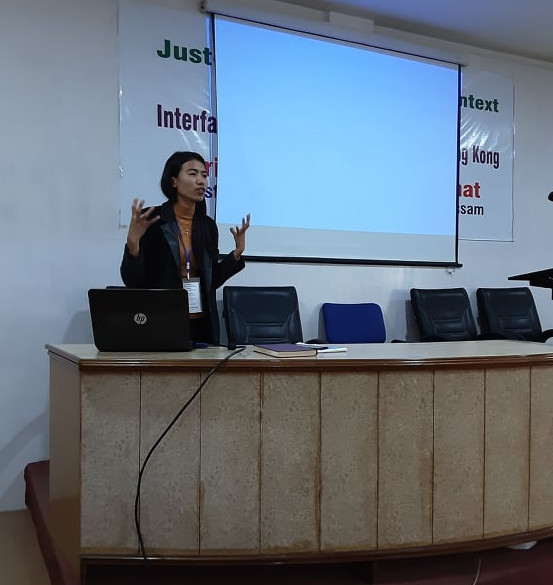
|
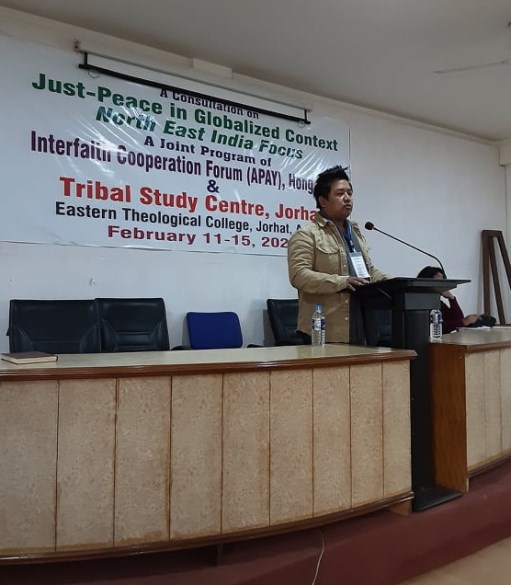
|
| ↑ Panellists |
This workshop calls for joint efforts to combat any forms of exploitation, oppression, and discrimination on the basis of caste, tribe, gender, religion, and community. It also helped the participants in analyzing the contemporary reality of forces that perpetuate violence and discrimination and to explore ways for building peace and harmonious society.
On behalf of the Tribal Study Centre, Eastern Theological College, take this opportunity to express our profound gratitude to the Interfaith Cooperation Forum (ICF-APAY), Hong Kong for organizing this important thematic workshop. We are deeply indebted to you!
~ Dr. Wati Longchar, In behalf of the ICF Coordinator
World Alliance National General Secretaries Conference held in Palestine – APAY General Secretary invited to Olive Tree Planting activities, a joint initiative of East Jerusalem YMCA and Palestine YWCA
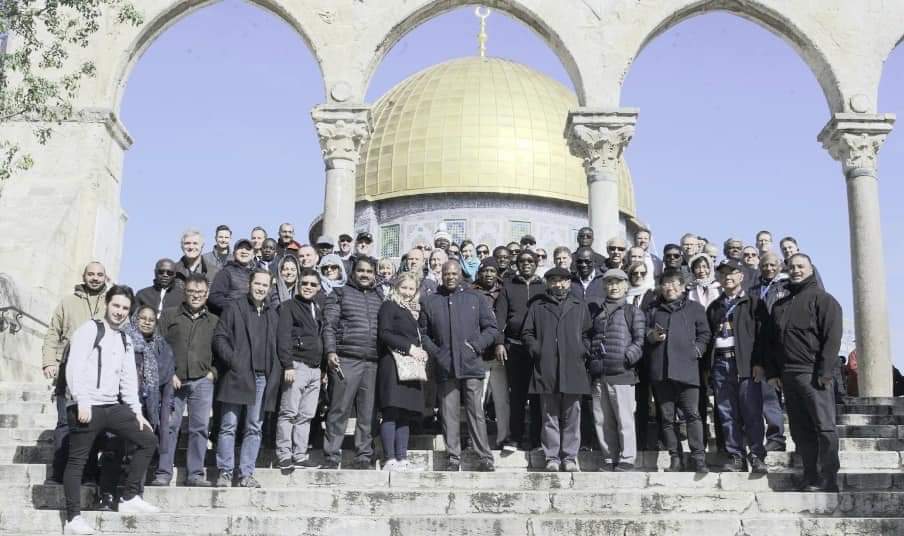 |
| ↑ Excursion to the Dome of the Rock within the Al-Aqsa Mosque, old city of Jerusalem |
2020 World YMCA National General Secretaries Conference was held in Palestine from 10th to 14th February 2020, hosted by East Jerusalem YMCA. APAY General Secretary Nam Boo Won attended the Conference with more than fifty NGSs from all the regions of the world YMCA, including seven National General Secretaries from Asia and Pacific region and world alliance staff.
Prior to the NGS Conference, the Global Staff Coordinating Team (GST), comprised of the six Area Secretaries and SG Carlos Sanvee of WAY, met one day earlier to discuss key issues and agendas which need ‘radical’ collaboration between Areas and World Alliance. The NGS Conference started with an informal dinner in the evening where early comers got together for greeting each other one year after they had met in Brisbane, Australia in Feb. 2019.
An official opening of the NGS Conference began with morning devotion on 11th Feb. In his presentation on ‘Our Collective Framework’, SG Carlos Sanvee shared on the progress made up to date on the key agendas initiated by the World Alliance since he took the position in 2019. Those are: Vision 2044 (North Star), Climate Change and Communities of Impact (COI), World YMCA Data Initiative, SDG Report, Road to Aarhus, Wicked Problems and Stress Management.
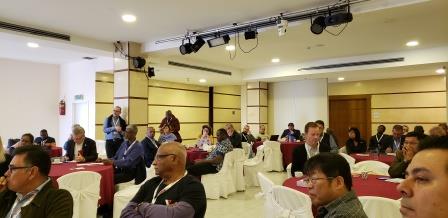 |
| ↑ Morning devotion during the NGS Conference |
Thereafter, these movement agendas initiated by World Alliance were discussed among the NGSs, that is, first, the ‘North Star’ project – the participants conducted a collective envisioning process towards 2044 when world YMCA will reach its 2nd centennial. After this, a pilot project on the World YMCA Data Initiative was shared with a view to collecting evidence-based data from all the national YMCAs, as well as creating an on-line data-base for multiple-purpose usage of it in the future. Another agenda discussed among the NGSs was the SDGs Survey Report – to gather information from the national movements with a view to figuring out the overall contribution of the YMCAs to the UN SDGs, which could be considered as an external indicator of the YMCA movement. In that evening, all the participants were invited by East Jerusalem YMCA for a welcome dinner and fellowship with key leaders of the YMCA as well as of YWCA of Palestine.
Next day, all participants were exposed to significant historic spots in Jerusalem and Beit Sahour, including Church of Nativity, the places where Jesus had been born and buried, the Chapel of Condemnation, the prison of Christ, the pathways to Golgotha where Jesus carried the cross towards his crucifixion, etc. On the third day, participants were again engaged in World Café discussion on how to cope with ‘wicked problems’ occurring from time to time as they, as NGSs, move forward to achieve YMCA mission and goals. In the afternoon, the NGSs also were guided into stress management as part of professional development. On the last day after morning devotion, participants collectively reflected on a ‘Road to Aarhus’ where the next World Council will be held in 2022. The conference ended with a collective consensus that there was a strong call for radical collaboration between NMs, Areas and World Alliance to multiply the overall impacts of the YMCA movement as a whole.
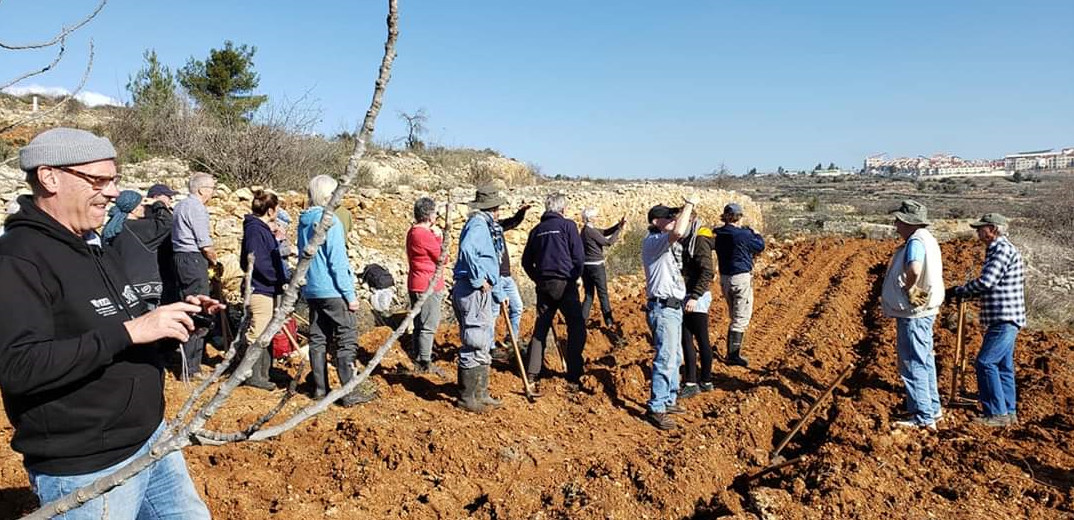 |
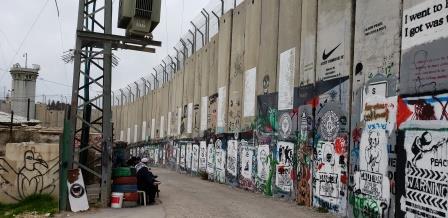 |
| ↑ Olive Tree planting activities in support of Palestine farmers |
↑ Dividing Walls - a stark reality of Palestine people |
After the NGSs Conference was over, GS Nam was invited by Joint Advocacy Initiative (JAI), a joint project between YMCA of East Jerusalem and Palestine YWCA, to participate partially at the Olive Tree Planting (OTP) activities in Palestine. Nam officially delivered to Mr. Nidal Abuzuluf, General Manager of the JAI, the OTP fund collected from the previous APAY board members who had decided in their earlier board meeting to promote the OTP within APAY in solidarity with the Palestine YMCA and its people suffering from the injustices prevailing in Palestine. Nam was guided to witness the stark realities being faced by the people of Palestine – the dividing walls, bleak refugee camps, check points, etc. On the last day, he was invited to join the Olive Tree Planting activities in Palestine with other group members most of whom were from Scandinavian countries. The OTP was widely recognized and appreciated as a very practical way through which to express our solidarity with the people of Palestine, by supporting the subsistence of Palestine farmers for we are called to pray and act on to help bring peace and justice in Palestine.
~ Nam Boo Won, APAY GS
|
